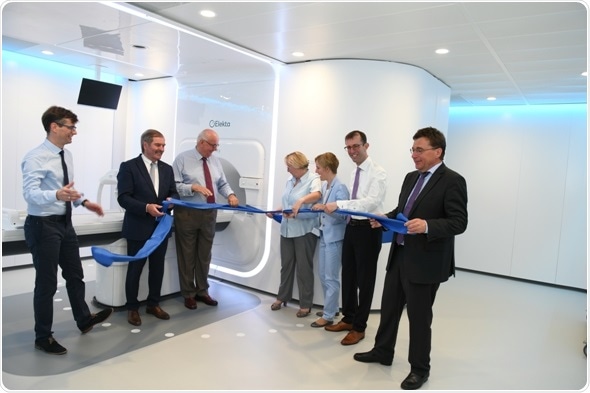Jul 27 2018
Elekta Unity combines advanced diagnostic standard MR imaging and precision radiotherapy technologies, giving doctors the “vision” to zero in on tumors and avoid healthy tissues
On July 25, the radiation oncology department at Tübingen University Hospital introduced its new Elekta Unity MR-linac, a groundbreaking cancer treatment system that integrates two critical but distinct technologies in a single platform: a state-of-the-art, high field wide bore 1.5 Tesla MR imaging system and a next-generation linear accelerator. This new technology enables clinicians to confidently see and track the target during treatment and respond accordingly, personalizing therapy for each patient every time they are treated.

Elekta Unity open house at Tübingen
“Elekta Unity ushers in a new level of personalized patient care in radiation therapy,” said Richard Hausmann, Elekta’s President and CEO. “We are pleased to celebrate with Tübingen University Hospital as they prepare to bring our shared vision of transformative cancer therapy to their patients. Elekta is committed to improving, prolonging and saving lives and to supporting our customers as they work with patients every day to achieve these critical goals.”
“Elekta Unity will give our clinicians the ability to see crystal-clear, high-field MR images while the radiation is being delivered. Tumors and surrounding tissues can be located and their movement monitored with accuracy at the time of treatment. This allows treatment plans to be adapted while the patient is on the table in response to changes in tumor position, shape, biology and the relationship to sensitive organs over time,” says Daniel Zips, MD, Chair, Professor Radiation Oncology at Tübingen University Hospital. “We expect that this enhanced real-time visualization of cancer targets will allow us to avoid healthy tissue as much as possible during the delivery of therapeutic radiation, leading to improved outcomes for cancer patients and positioning Unity as a truly unique way to treat cancer.”
The hospital imaged the first patients with the 1.5 T MR imaging system and calculated the first MR-based treatment plans on June 19 when the Unity CE mark was issued. Tübingen University Hospital expects to use Elekta Unity to treat a wide range of cancers and potentially enable new therapeutic options for hard-to-treat cancers with anatomies that require high-field imaging to effectively distinguish the tumor from nearby healthy tissues and organs-at-risk. This allows anatomical structures that previously were deemed unsuitable for radiotherapy to be considered for treatment and gives the care team greater flexibility in their approach to radiation therapy. It also ensures each patient receives optimal care based on individual tumor characteristics every time treatment happens.
“It was exciting to showcase Elekta Unity during the open house,” added Dr. Dr. Daniela Thorwarth, Chair Research Section Biomedical Physics at Tübingen University Hospital. “We are especially proud to serve this community, and beyond, with the newest, advanced technology that will potentially transform how we treat individuals with cancer.”
Elekta Unity has CE mark but is not available for commercial distribution or sale in the U.S.